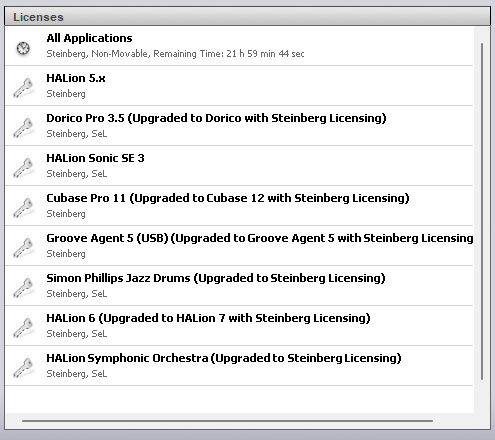I’d personally just try to recover the missing ‘HALion sound content’ and see if you can get it imported and working in the current version of Sonic or HALion. HALion itself is supposed to be able to import and use all generations of HALion content/libraries (older eLicenser/dongle keys might need to be in place).
Tracking down old HALion content might be easier said than done, but it should be possible.
The newest versions of Sonic/HALion should be able to play the H1 ‘sounds/libraries’ if you can still find and import them.
Were you using the stock HALion player that came with Cubase/Nuendo, or did you have some kind of more advanced ‘full version’ of HALion? If you had some advanced retail version, hopefully you still have the ‘disks’ or backup images from your purchase. You’d use the original disks to extract the ‘sounds/content’ and import it into your modern HALion/Sonic player.
If you really need to ‘roll back’ and use old stuff…
One issue with rolling back on pure ‘full’ HALion versions is that you ‘might’ require a special HALion 5 key on a USB eLicenser. With the rollout of HALion 6, Steinberg added the ability to put HALion/Sonic on the soft eLicenser. Versions older than H6 can’t use the newer keys. To get versions of HALion older than 6 working, one needs to contact Steinberg Support and explain why you need the ‘additional H5’ USB key. It’s a special key that can only exit on a Steinberg eLicenser USB dongle, can never be ‘upgraded’, and that doesn’t ‘replace’ any other HALion keys on your dongle. The only way I know of to get it is to write Steinberg Support and ask for it.

Note, I personally have never needed to roll back ‘that far’ to get older Cubase projects working, particularly if they were using the ‘SEish’ version of the HALion player that ‘shipped with Cubase’, but maybe there is a way…
Some strategies…
If you never had a special/fancy/full retail version of HALion (apart from what ships with Cubase)…then your ‘roll back’ journey should be much simpler.
If you’ve still got your USB elicenser and all in place…you might try installing which ever version of Cubase you used to make the project(s). Hopefully you won’t have to remove or mess with your current setup (Less chance of older versions conflicting with the newest if you’re rolling all the way back to 32bit world). If it does require messing with your newest installation…you might pop in a fresh boot drive or make a small boot partition for ‘rollback purposes’ to avoid messing with your best working setup…maybe trying a virtual machine, or even use a totally different machine…maybe you still have one of the old ‘door stop’ systems in the closet you haven’t been using?
From there it might be easier to track down whatever plugins and content are missing, and potentially plot out a plan to find suitable ‘replacements’ if you can’t get it working in the ‘original state’.
After clicking here:
Cubase 5 | Steinberg
Scroll way down the page, almost to the end.
Under the heading: Cubase 5.5 ISO Image,
There is an ISO disk image for Cubase 5.
Somewhere on that image, the thread above suggests there is a directory with H1 that can be extracted and placed in the VST2 directory of a modern setup? I’ve never tried it…so don’t know. I have no idea if there was a special retail version of H1 sold separately back on those days, or if it was simply the player/engine that came with Cubase? I don’t know if it would be 32bit, 64bit, or both. Etc…
If it’s 32bit only 3rd party bridges and such (jbridge, bidule, bluecat, whatever you use for this) might be required to get it working in Cubase 12. Or…roll back to the last version of Cubase that came in 32bit (or would run 32bit plugins without bridging…I forget, but I think that’d be Cubase 10?).
At this point I’m taking shots at ‘guessing’. On the Steinberg Downloads page, there is also an ftp site.
ftp://ftp.steinberg.de/Archives
Sometimes you can dig around in that to find old versions, or specific HALion libraries or ‘content sets’ (or versions of things that would have it all buried somewhere in the download).
It appears that a good bit of the legacy stuff on the ftp site requires you have original installation media (or find a full ISO image of it somewhere). It never hurts to explore the site to see what you can find though.
If all else fails, you might simply contact with Stienberg Support. Send them a full copy of your old project. They might get back with you on the best steps to take in getting the project working in your current version of Cubase. You might even get lucky and end up with a rep who sends you back a working project (though I wouldn’t hold my breath).

